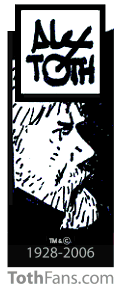Remembering Alex Toth - Part 2
Contributed by: tothfans on Wed, August 2, 2006 / 12:08am CDT
Official Alex Toth website :
Articles :
Remembering Alex Toth - Part 2
Tags:
Remembering Alex Toth - Part 2 [Part 1 here]
San Diego Comic-Con
Sunday, July 23rd 2006, 6:00-7:30pm Forum Discussion
David Armstrong: It?s interesting because the thing is that he did have very exacting standards for his work. He felt very strongly about the things that he drew and the stories he created. Probably, Ruben knows some of the stories of about how ? there are stories he worked on and felt very strongly about ? and maintain his position quite strongly. [Inaudible]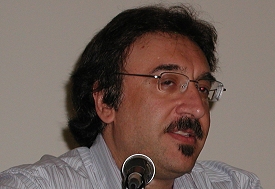 Ruben Procopia: Well, I think you?re describing, quite strongly, his audience ? knowing Alex. I think Tom may want to jump in here ?cause you may know a lot as well as far as his thoughts behind the storytelling. I don?t think I could put it more eloquently than how Irwin put it that his main thing was always simplicity. He was very particular about the stories he took on. I know that he was very frustrated as a storyteller ? if you can believe that. For many years, especially in the last 15 years or so, he could not come up with his own story. And tried his best but got to the first page or so and gave up. So, I would say, yes, he was very strong-willed as far as the authors, the writers of the stories he get in his early years. Perhaps Tom?. Ruben Procopia: Well, I think you?re describing, quite strongly, his audience ? knowing Alex. I think Tom may want to jump in here ?cause you may know a lot as well as far as his thoughts behind the storytelling. I don?t think I could put it more eloquently than how Irwin put it that his main thing was always simplicity. He was very particular about the stories he took on. I know that he was very frustrated as a storyteller ? if you can believe that. For many years, especially in the last 15 years or so, he could not come up with his own story. And tried his best but got to the first page or so and gave up. So, I would say, yes, he was very strong-willed as far as the authors, the writers of the stories he get in his early years. Perhaps Tom?.
Tom de Rosier: The other thing is that, too ? I had been writing with Alex since 1990 and when I finally moved to L.A. about 3 years ago I started spending time visiting with him, and the impression that I got after the first few months was that he was always his own worst critic. And that shut him down as far as completion or getting his own story of the ground ?as he became more mature. At the same time, that was one of the things I found so refreshing about him. As a younger artist ? he was his own worst critic. I was amazing to me to finally get a chance to meet my hero and sometimes bring examples of his old work, discuss with him, try to get thoughts from him bout his own work in the past or more recent work ? and he was just so critical of his own stuff. I live in a generation that hypes itself a lot, sometimes feels its? very self-entitled or has a lot of unwarranted confidence and I felt it was astounding that he was never pleased with his own work ? and I think that factored into his frustrations with his own stories as he got older. David Armstrong: One of the things I was going to say?.Mike?.. Mike Royer: Well, yesterday I ran into one of my mentors, Sparky Moore, Richard Sparky Moore, who worked a lot with Alex in his 10 years at Whitman Publishing ? Dell Comics. And Sparky said he was there the day Alex walked into the office and walked by [Inaudible] Craig?s office and hurled a vile epithet at him and walked into the President?s office and proceeded to read his 14-page letter of criticism of what was wrong with Western Publishing?s attempt to produce comic books. When he was finished the president of the west coast office turned to Alex and said, ?Well, I don?t give a damn and I?m sick and tired of your figures that look like bananas!?And Alex walked out into the hall and said, ?Sparky, do I draw figures that look like bananas?? [Laughter] David Armstrong: I was going to say was as I was going through the art ? putting the show together for tomorrow. Obviously, there were two different worlds I was looking at ? his comic work and his animation work. It?s interesting to look at the animation work ? he really thought in terms of motion and movement. And when you look at his boards, they?re very, very complete boards. There are notes ? the same as he puts on a comic page ? about coloring and pacing and everything else; about how you pace, what you use for music, what you use for sound effects. He literally stages the entire scene and I think that?s one of the things he did with his comic book pages. He staged the entire scene. A lot of times if he wasn?t happy with the entire scene he would think about starting it over. That?s what I mean about his exacting standards. Paul worked with him when he went to Australia and I?m sure that the same was true ? he went there to oversee the Australian crew that was doing? Paul Power: Superfriends?. David Armstrong: Doing stuff for Warner Brothers ? cheaply, by the way ? which is the reason why it went to Australia. But he was there to supervise and get them to come to his standards. And I?m sure it was interesting? Paul Power: What I would like to say to that ? I was 17 then. I was an amateur boxer, so I was boxing. I was also singing in a band and just thrilled to bits to be working in animation with a lot of guys ? Monty [Inaudible], Hal English, Robert Smith ? these guys were drawing comic books in Australia. And we were in the layout department and then Alex came over and we all went to the pub down the street. At 17 I looked 15 but I was built like a pocket Hercules so they let me in. And we had drinks with Alex and I turned up with a bag full of comic books and I went over to him ? they were all taking, it was a meet-and-greet kind of thing ? and I said, ?Yea, I remember your stuff. You drew Clutch Cargo.? And he said, ?I never drew Clutch Cargo.? And I said, ?Yea, you did.? And he said, ?No, I didn?t.? And said, ?You did.? And he said, ?Yea, I did?? [Laughter] He said, ?How?d you know?? And said, ?I know your style.? And I stared talking about these other things and I asked him about the comic. The one comic book which I felt that he did that was ruined ? it was my favorite comic book ? it was ruined by an inker, Vince Colletta and that was X-Men #12. And he worked with Jack Kirby doing the first Juggernaut story and it?s really, really good stuff but it?s a really, really lousy inker? 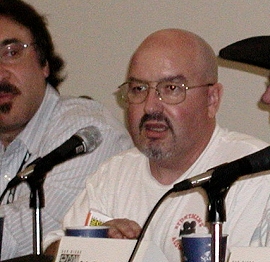 The great thing about Alex is that he [taught] me about acting with a pencil. He was really was an actor. And he told me the stories that he really enjoyed drawing when he was younger. He said ?Oh you like that stuff I did.? You know like the stuff he did for DC at the time. The ? The stuff I really liked is the things he did for Standard ? the romance books because he really had to get his characters to act. It forced him to work even harder than before. And being such a buff of movies, as all the good cartoonists were, they weren?t just interested in what other cartoonists did, but they like Albert Dorne, Robert Foster, Noel Sickles and all these other guys. A great, great period of illustration in America. And Alex took the movies in, and being a big fan of Errol Flynn I actually took him to the jail where Errol Flynn was busted. I took him in to meet the jailer, I took him to the pubs where Errol Flynn went walking around the streets, and he really, really loved it. The great thing about Alex is that he [taught] me about acting with a pencil. He was really was an actor. And he told me the stories that he really enjoyed drawing when he was younger. He said ?Oh you like that stuff I did.? You know like the stuff he did for DC at the time. The ? The stuff I really liked is the things he did for Standard ? the romance books because he really had to get his characters to act. It forced him to work even harder than before. And being such a buff of movies, as all the good cartoonists were, they weren?t just interested in what other cartoonists did, but they like Albert Dorne, Robert Foster, Noel Sickles and all these other guys. A great, great period of illustration in America. And Alex took the movies in, and being a big fan of Errol Flynn I actually took him to the jail where Errol Flynn was busted. I took him in to meet the jailer, I took him to the pubs where Errol Flynn went walking around the streets, and he really, really loved it.
But he had a such a tough time trying to elevate the standard of which was really just a, well?bad show. A lot of good talent, but not a lot of great people. And he busted his ass on it. And when he was really, really happy and we hung out the whole time. Even then I was working on a comic strip that I?m working today ? East Meets West ? and he said, ?Oh, I like this stuff.? And I guess because I was 17 and he was 17 when he started, sometimes you need just one person to say, ?You?re all right, kid. Here do this, this, and this.? And he actually said, ?If I give you some tips, will you take them?? And I said, ?I?ll steal them.? And he did, he was great. He used to write me these great letters about breaking down the stories that he did, especially with Archie Goodwin, and how he would have like to drawn Batman more. He had a brief stint where he working on movies over at Universal and he really did want to do storyboards for film and then he got Hong Kong Phooey and that kind of took him out of it. I always saw him as a consummate artist, he was color-blind, but his design sense, his drawing sense, his pacing ? you could hear music in his stuff.Even to this day the biggest and best art school I went to was to work with Alex Toth. If any of you guys saw Superman Returns, there is only one part of one sequence [that] I worked on ? the flying sequence where he get the plane [and] rips the wing off , I did that but the inertia where he pulls the plane in, catches it and brings it down to the baseball diamond. I put that inertia as actually a shot that Alex did draw in Superfriends. The whole ripple from the fuselage, that?s an Alex Toth number. I put a lot of Alex Toth in that sequence. If you?ve seen Top Gun ? there?s the two stories that Alex did ? Thunder Jet ? and what was the other one? David Armstrong: Saber Jet Paul Power: I swiped those panels. They?re in Top Gun. Go back and have a look at them. All except, giving the finger, that was mine. [Laughter] David Armstrong: I don?t know if many knew this but Alex used a lapboard to draw. He did have a drawing table but kind of propped his board up in front of it and did his comic work. Eric, I?m going to get you involved. Do you remember sitting there watching him do work at home? Eric Toth: Yeah, I have vague memories of that, even as a little kid. He would typically work into all hours in the night because either things aren?t good enough or he wouldn?t find the right inspiration until 2 [in the morning] which I think artists can understand. Dana and I were just talking about it, how uncomfortable it was ? ?my shoulder?s really sore? ? but that was his choice of working and somehow he managed everything on a really small board. Dana Palmer: It was cutting board from the kitchen. He was the ultimate minimalist. Eric Toth: He would test all his pens and brushes on the edges of the board. So, even the just the board itself started taking on a pattern and design. Which he was really fascinated with ? with pattern and texture. If you look at a lot of 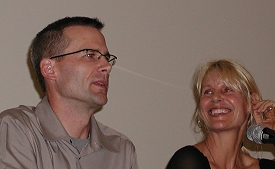 his work where he uses Mayan or Aztec [like] patterns or things that Frank Lloyd Wright would do. I share [Irwin?s] thoughts that my Dad was a genius and the way that his mind worked, the way that he remembered things because he would never use scrap for anything. Everything was copied up here and he would talk about how he had a photographic memory. I know that?s something I would appreciate in my line of work. He saw everything in silhouette. I had the opportunity to go to Art Center College for automotive design and I would dhow him my work. He was always careful about how he critique my work, may be because I was his son. But, he would always say, ?Why are the teachers having you draw it so big for?? So, he almost of took it away from me and directed it at the instructors. I also worked hard to get him to think about teaching because the Art Center, or any school, would have loved for him to teach. But, it was either his modesty or seeing himself as someone who could teach even though he did it in all the letters and postcards he shared with all the different artists and fans. That?s something that we wished he did more formally but we?re realizing now that he did it informally with the hundreds of thousands of people he?s contacted throughout his life. his work where he uses Mayan or Aztec [like] patterns or things that Frank Lloyd Wright would do. I share [Irwin?s] thoughts that my Dad was a genius and the way that his mind worked, the way that he remembered things because he would never use scrap for anything. Everything was copied up here and he would talk about how he had a photographic memory. I know that?s something I would appreciate in my line of work. He saw everything in silhouette. I had the opportunity to go to Art Center College for automotive design and I would dhow him my work. He was always careful about how he critique my work, may be because I was his son. But, he would always say, ?Why are the teachers having you draw it so big for?? So, he almost of took it away from me and directed it at the instructors. I also worked hard to get him to think about teaching because the Art Center, or any school, would have loved for him to teach. But, it was either his modesty or seeing himself as someone who could teach even though he did it in all the letters and postcards he shared with all the different artists and fans. That?s something that we wished he did more formally but we?re realizing now that he did it informally with the hundreds of thousands of people he?s contacted throughout his life. Paul Power: I wanted to say this ? I would not be here in America if not for the fact that I had worked with Alex Toth. Because I worked with Alex Toth I got to do the Road Warrior, Mad Max films, a lot of other films. If you want to go to paulpower.com you?ll see it. But, a lot of stuff I?ve done, like the RunDown and such, there?s a lot of Alex Toth in there. Because, he really was an actor. And recently, I?ve been reading more about John Ford. There?s a lot of Toth in John Ford or there?s a lot of Ford in Alex Toth. They?re very similar ? volatile, sensitive. I think Alex was the more reasonable out of the two but they?re pretty much the same sort of guy. But they both did outstanding work and both were just dynamite artists. The thing with Alex was always the story, the story, the story and he absolutely loved working with Archie Goodwin. These two guys in the back, Anson and Benton Jew, were with me when we did the interview. I?m glad they got to meet Alex before he passed away. It was very important for me to do that and it was important for me to rekindle my friendship with Alex. And thanks to C.A.P.S. that?s how I found out he was ill ? I had no idea. We had a minor falling out and that happens. It was really great to hook back up with the guy because I really owe him everything. God bless him. David Armstrong: One of things I noticed as I was going through the artwork is that as time went he on he started working smaller and smaller ? in terms of his originals. Which is amazing because artists generally like to work a little bit larger than reproduction size because it comes down, tightens up, it looks better. But, to my mind, working that way, getting closer to the actual reproduction size meant that he was probably more in control of the image than most other artists. For example, Oh La La, which is a story that some people may know, was done on a DC page, side by side, two pages to each DC page. So, it?s this big instead of this big. And they?re side by side.And it?s really spectacular to see the drawing in that. I think that as time went on he continued to better and refined his style and what he was doing. And I think it translated into animation work, as well. Mike Royer: We went together to one of Phil Seuling?s convention in New York. It was about the time the page size was changed, pretty much universally in the business and it had to do with printers. And at that time Alex was not at all happy. And the panels he was on he was quick to bring up the fact that the tail is wagging the dog ? the printers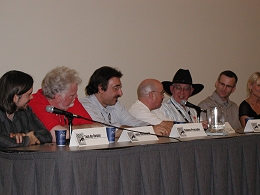 are determining what size we draw the art. And the one artistic thing that I learned from Alex, and I?ll never forget, we were at his sister?s in New Jersey having dinner the day before the convention and we were eating and there was a bowl of shallots on the table. I picked one up bit the white out and put it down and he said, ?Eat the whole thing to the end.? And every time I eat a shallot I think of Alex. are determining what size we draw the art. And the one artistic thing that I learned from Alex, and I?ll never forget, we were at his sister?s in New Jersey having dinner the day before the convention and we were eating and there was a bowl of shallots on the table. I picked one up bit the white out and put it down and he said, ?Eat the whole thing to the end.? And every time I eat a shallot I think of Alex. David Armstrong: That?s touching. [Laughter] Tom, in the work you saw him do, did you see, as time went on, the simplification of his line and the use of his blacks. Give more definition in terms of what the story was and the characters and the illustration? Tom de Rosier: Yea? [Laughter] Ask that again?. David Armstrong: I just think the smaller he got, the more simplified he became in terms of tossing out all the extras?. Tom de Rosier: Comparing say, Oh La La to [inaudible] David Armstrong: He still used props to be able to tell the story but he used them to make sure they were telling the story. Tom de Rosier: Maybe the way that I would answer that is that I think there?s a difference in his work after you see him in Hanna Barbera, his animation work which is before something like Oh La La. I think animation definitely affected all the work he was doing, including the comics. If you look at Black Canary, a two part story ? there?s an economy and a precision and a sense of design that wasn?t present in the earlier comics. There?s a strength and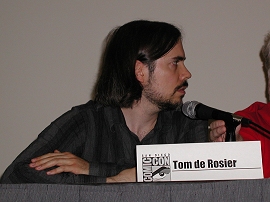 integrity to the layouts. For me there is a difference in his work once you hit the animation. He was constantly evolving, that?s what makes it such an exciting ? his work is so fun and exciting to look at from the beginning to the end of his career because it was always searching, changing. There was always a Toth quality about it but it was constantly in motion and moving forward. He was very restless, in a healthy way, with his work. For me there is a big difference once he hit the animation stuff? integrity to the layouts. For me there is a difference in his work once you hit the animation. He was constantly evolving, that?s what makes it such an exciting ? his work is so fun and exciting to look at from the beginning to the end of his career because it was always searching, changing. There was always a Toth quality about it but it was constantly in motion and moving forward. He was very restless, in a healthy way, with his work. For me there is a big difference once he hit the animation stuff? David Armstrong: He also had several periods where he [left] animation and went back to comics and then moved back to animation. Ruben, you followed that stuff pretty closely in terms of style? Because I know you loved the stuff from the mid-80s?. Ruben Procopio: Absolutely. I was shocked when I first saw Oh La La, the originals. He did turn the page sideways and economize by using half the page. At first I thought, ?Well, maybe he?s trying not to buy another piece of paper?? David Armstrong: Be cheap?. Ruben Procopio: But, as sort of studied it and approached him about it. I realized that is all about economy. The whole thing about simplicity ? even down to the materials that he used which was just a simple pencil and felt pen. Not even ink and a brush which is an absolute no-no in comics. He revolutionized that to the point where it made it O.K. to use a felt pen to ink comic book pages. I tried to apply it to my work and I realized that?s it?s just brilliant to do it that way ? to draw actual size of how you are going to print it. It forces you to look at and see exactly how it?s going to be done.When you do it large, sometimes you lose focus of what you?re doing because it?s so huge. It was just an incredible approach. Anything Alex did was very innovative. There was many years where he did experiment ? witness in the books put out on him- he tried felt pens, he tried --, he tried this, he tried that. What came out of that is brilliant, incredible stuff. I think, in the end it was, again, simplicity. In proof, the letters you got, we all got, were done on just a simple blank piece of eight and a half by, whatever, 6?. David Armstrong: 6 by 9. Ruben Procopio: ?6 by 9 writing tablets. Which he would have me get on a monthly basis, like a stack of 10. I was marveled by it because I thought he must have some magical materials and magical stuff that I don?t know of. Somehow he got something that we in the mainstream can?t get a hold of. Getting to know him ? its just, again, simple, everything?s simple. John Hitchcock: I really think the term simple or simplify. The way Alex was he always considered himself a student ? which was so refreshing and sometimes confusing ? because he was such a grand master. You see a lot of people that would do a panel with 100 or 150 lines on it. But Alex could do a panel with 8 lines.And it would be perfect because he had so much knowledge [and] he had so much control. His sense of anatomy was just unbelievable. You have that kind of knowledge or understanding of anatomy to be able draw something that cleanly and that simply and still have all the expression[s]. He was crazy about different ethnic groups. You can look at his work and see every different type person you can think of. The sketches he would send to us, there would be lovely women and old men, people from Uganda and all over the world. He was so fascinated with it. But, when you think simplify you sometimes confuse that with simple and there was nothing simple about his work. He tried his whole life to get ? and it was probably Saul Harrison telling him, ?You don?t know what to leave out? in the ?40s?. Unidentified: Shelly Mayer? John Hitchcock: I know that Harrison used to yell at him evidently, ?you still don?t know what to leave out.? But, yea, Mayer was very important. But that was what ?s deceptive about Alex is that he was constantly trying to refine what he was doing. There are so many artists, even today; they will hit a style where they can live and they can make a lot of money and they never grow. Alex was in a constant state of learning, experimenting and trying to get better. Which was ridiculous because he was one of the best artists in the world ? 1952. Murphy Anderson said [that] the people at DC told him to draw like that Toth guy ? which drove Alex crazy. Because he said that if he knew that he would have taken a swing at them, they should be able to draw the way they want to draw, they should be able to have that perspective. It?s always driven me crazy when some people say [that] his stuff is simple. There?s nothing more complicated that what he did, that what Alex Toth did. It?s an amazing thing. The trick of Alex?s work is to read it - you have to read it. If you read it, he will pull you into that story, he will grab your attention and he will take you places. It?s fascinating, it?s absolutely brilliant. If he heard me say that he would say, ?Pish, posh, and piffle, Hitchcock.? ? he would blow it off. But, it was the truth. Irwin Hasen: I?m listening to these people who knew him all these years and I?ve seen some of the work he?s done in books compiled. I have the feeling, listening to all this stuff here, that Toth was what Film Noir was to Holly wood. When I see Film Noir movies, those wonderful black and white movies, I always thought of Alex. I always thought of Alex Toth transferring his talents into the page, the comic book and also his other work to those geniuses of Film Noir ? Andre de Toth , a director from those days, and a few others. I think with all the details that he put through, the genius of Alex was the blacks, the blacks and the simple line. He made them dance for everybody. He made those figures dance and it was like he was laughing at everybody. ?I?m going to take this black slab and put it near there.?I never knew him ? I knew him when he was 16 years old. ? that?s all. I knew him when he was 18, 19, 20 and that?s it. So I?m listening to what he is today, how he affected everybody. But when I looked at his work over the years ? not meeting, not seeing him again, my old friend, my young kid friend who I was 10 years older [than]- I watched his work manipulate blacks. There was the genius; he manipulated a picture with blacks. And I always had a feeling he was happy, he was going like this to everybody. It was the gut feeling I had about Alex?s work. ?Screw you, this is the way I do it and it?s the way you should do it too ? that?s what he would say. ?Screw you, you should do what I?m doing, you assholes, for God?s sake! Don?t you see that?s the way it plays on a page, blacks and this and that and make them dance on a page.?And that?s the wonderful feeling [I had all these years]. Never met him again, ever. Talked to him very briefly, always got letters, postcards. Remember that movie Postcards from the Edge? - Postcards from Toth. The mailman would always look at me when he delivered one ? ?For God?s sake he almost covered up the stamp!?. [Laughter] Every inch and he must have been giggling all the way to the U.S. Post Office. Sorry, I didn?t mean to go off at the mouth? Dana Palmer: That was daddy but he wasn?t laughing at the postman, he couldn?t help himself. It was who he was. Nothing in his mind was manipulated. The thing that I take from him ? I?m not a cartoonist, I?m am an artist, he used to say, ?Dana, tell the story with the fewest words, draw the picture with the fewest lines. That is the best you can do.? I agree with him, that?s a challenge. My father practiced every medium of art. He didn?t read a book how to do it - he just did it. He just picked it up and did it. It was an odd twist that he could be arrogant and opinionated about all kinds of things and work but then so humble about his own. And yet, I never heard him compete with anybody. He was like a race horse with blinders on. He did what he did because he had to do it. Nowadays, and as a photographer I see it, where bells and whistles and ?I?ve got to have this and that? ? my father used tools. And they were just tools. His felt pen was a tool, his mechanical pencil ? it drove him crazy. ?Dana go get me a mechanical pencil, I want a #5, I want this?.? I knew exactly what he wanted; I had seen it since 1958 when I was born. And I would go to Office Max or Depot and try to find these things and say, ?Daddy, I can?t find them for you? ? it made him crazy. That?s all he needed ? the pads, the pencils, the pens. And this is the way he was ever since we were living with him all the way until the day he died. 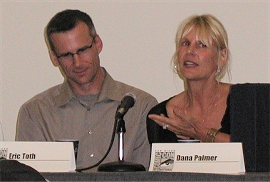 And in his last month, his last time in I.C.U. when everybody sent cards and letters ? I will never forget this ? because he said, ?Life has come full circle. Dana you always believe there is a reason behind everything?. And I had never seen him this touched before but as he was reading all the notes and letters, he said, ? I can?t believe this. My whole life I never believed anybody when they said my work was good ?. It was surreal to him. It went in, it went out ? he did what he did because he needed to do it.He said, ?I only ever said two things ? one: whatever you do, do it with simplicity and two: whatever you do, do it with honesty. When I read these today, I realize they got it?. And that meant everything to him. That was the only message he ever wanted to get out. That was very prophetic, and the whole experience was with my father. I used to dread this day because I knew nothing of his work and I was arrogant because, as a little girl, that?s all he talked about and wanted to know a different part of who he was. In the last year of his life he became that man and that man is a great man. Even aside from what he did with his pen. And in his last month, his last time in I.C.U. when everybody sent cards and letters ? I will never forget this ? because he said, ?Life has come full circle. Dana you always believe there is a reason behind everything?. And I had never seen him this touched before but as he was reading all the notes and letters, he said, ? I can?t believe this. My whole life I never believed anybody when they said my work was good ?. It was surreal to him. It went in, it went out ? he did what he did because he needed to do it.He said, ?I only ever said two things ? one: whatever you do, do it with simplicity and two: whatever you do, do it with honesty. When I read these today, I realize they got it?. And that meant everything to him. That was the only message he ever wanted to get out. That was very prophetic, and the whole experience was with my father. I used to dread this day because I knew nothing of his work and I was arrogant because, as a little girl, that?s all he talked about and wanted to know a different part of who he was. In the last year of his life he became that man and that man is a great man. Even aside from what he did with his pen.
[Applause] END PART TWO Panel : David Armstrong (moderator), Irwin Hasen, Dana Palmer, Eric Toth, Mike Royer, Paul Power, Rub鮠Procopio, John Hitchcock and Tom de Rosier Trascribed by Kirsten Rose Transcript Copyright 2006, The Estate of Alex Toth all rights reserved.
|
